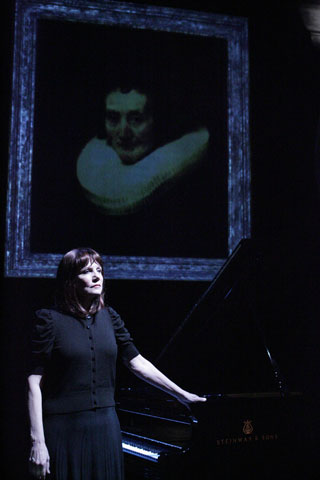
Mona Golabek in “The Pianist of Willesden Lane”
Live theater is always fresh even when the story breaks your heart. The actors pour themselves into the feat of becoming another and convincing us that their pain, joy, dilemmas, tragedy and triumph are real.
Through the kindness of friends, Daughter of St. Paul Sr. Marie Hunt and I were able to experience "The Pianist of Willesden Lane" at the Geffen Playhouse at UCLA.
The Audrey Skirball Kenis Theater within the playhouse is intimate at only 115 seats, or parlor armchairs, arranged on low graduating tiers in a half circle. Low lighting created an ambiance of elegant darkness with four gilt portrait frames hanging in front of the curtained backdrop, itself framed in gold. Once my eyes became accustomed to the low light I made out the outlines of an aged concert piano.
A youngish-looking woman appeared on the stage. She wore a simple black dress and spoke directly to us. Her name is Mona Golabek but all of a sudden she is Lisa Jura, who is 14 years old in Vienna. The year is 1938 and Lisa is going for a piano lesson, all by herself on the streetcar. Once at her teacher's apartment he tells her that after today he can no longer teach her because it is not safe. Lisa is a Jew.
Then comes Kristallnacht, when ordinary Germans and Austrians destroyed shops owned by Jewish people, and Lisa's father can no longer work. He begins to gamble to support his wife and three daughters. One night he comes home with nothing but a crumpled ticket in his pocket. His wife is frantic, but he says it is a ticket for the Kindertransport that will take Jewish children to England because Christian people there know something is coming and they want to help the children. But his wife screams in anguish. How can you choose which girl? But they choose Lisa, the musical prodigy.
Their last words to her guided her life from then on: Hold on to your music.
Then Golabek, herself a musical genius and concert pianist, sits down to play us to the next act, knowing the precise musical selections so dear to her mother, Lisa, who treasured the music she learned from her own mother. Golabek does this throughout the 100-minute performance, holding on to her story and the "layers of music" captured in this compelling yet gentle story of three generations of gifted women. The darkest, most horrific episode in history forever marked their lives, but the music gave them hope.
"The Pianist of Willesden Lane" opened on April 25. It has been extended four times. Golabek and Lee Cohen based the play on their 2003 book The Children of Willesden Lane. Hershey Felder adapted and directed the production. The play begins a multi-city tour beginning in Boston at Emerson College's Paramount Center on Nov. 23 through Dec. 16. Online ticketing is available.
"The Pianist of Willesden Lane" has everything: family, children, loss, drama, music, humor, love and romance, and generous Jews and Christians in England who welcomed and saved 10,000 children from Hitler. It is a story of the Holocaust told with a voice we perhaps have not heard before. It remains true to the memory of those who perished while filling all who experience the play with hope in humanity — and music.
Golabek took acting lessons to prepare for her role in the play, but I learned this from a friend who attended last month and spoke with Golabek after. She seems born to play this role and her gentle spirit is captivating.
I had the pleasure of meeting Golabek as well. I asked if the book or play was being made for the screen. Not yet. I would love to be the filmmaker who gets to turn this book into cinema.
"Hold on to your music," her parents told Lisa and she did — and lived. How many more children might take courage in difficult circumstances if they knew this story of the Holocaust? How many children could benefit from Lisa's story, which embodies and celebrates the transcendence of art and the human spirit? Hold on to your music, your writing, your poetry, your painting, your sculpting, your filmmaking, your art. It will save you.
"The Pianist of Willesden Lane" is a reminder of the vital place of the arts in education. Art and hope go together.
The play and book, through online resources, "offer ways for students to talk about historical responsibility, moral choices, and self-reliance."
More
For more information and resources for education visit Mona Golabek's Hold On To Your Music Foundation.
[Sr. Rose Pacatte, a member of the Daughters of St. Paul, is the director of the Pauline Center for Media Studies in Los Angeles.]




